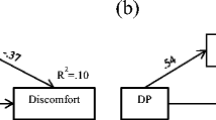Abstract
In response to recent recommendations for the teaching of principled moral reasoning in business school curricula, this paper assesses the viability of such an approach. The results indicate that, while business students' level of moral reasoning in this sample are like most 18- to 21-year-olds, they may be incapable of grasping the concepts embodied in principled moral reasoning. Implications of these findings are discussed.
Similar content being viewed by others
References
Arlow, P. and T. A. Ulrich: 1983, ‘Business Ethics, Social Responsibility and Business Students: An Empirical Comparison of Clark's Study’, Akron Business and Economic Review (Fall), 17–22.
Baxter, G. D. and C. A. Rarick: 1987, ‘Education for the Moral Development of Managers: Kohlberg's Stage of Moral Development and Integrative Education’, Journal of Business Ethics 6, 243–8.
Blasi, A.: 1980, ‘Bridging Moral Cognition and Moral Action: A Critical Review of the Literature’, Psychological Bulletin 88(1), 1–45.
Blatt, M. M. and L. Kohlberg: 1975, ‘The Effects of Classroom Moral Education Upon Childrens' Moral Judgment’, Journal of Moral Education 4(2), 129–61.
Brabeck, M.: 1984, ‘Ethical Characteristics of Whistle Blowers’, Journal of Research in Personality 18, 41–53.
Buchholz, R. A.: 1981, ‘Ethics and Management Education’, paper presented at the annual Academy of Management meeting, August.
Cohen, J. R. and L. W. Pant: 1989, ‘Accounting Educators' Perceptions of Ethics in the Curriculum’, Issues in Accounting Education (Spring), 70–81.
Colby, A. and L. Kohlberg: 1987, The Measurement of Moral Judgment: Theoretical Foundations and Research Validations and :Standard Issues Scoring Manual, Volumes 1 and 2 (Cambridge University Press, Cambridge, MA).
Colby, A., L. Kohlberg, J. Gibbs and M. Lieberman: 1983, ‘A Longitudinal Study of Moral Development’, Monographs of the Society for Research in Child Development Series No. 200, 48(1 & 2), 1–107.
Fulmer, W. E. and B. R. Cargile: 1987, ‘Ethical Perceptions of Accounting Students: Does Exposure to a Code of Professional Ethics Help?’, Issues in Accounting Education Fall, 207–19.
Furman, F. K.: 1990, ‘Teaching Business Ethics: Questioning the Assumptions, Seeking New Directions’, Journal of Business Ethics 9, 31–8.
Kohlberg, L.: 1981, Essays in Moral Development, Volume I: The Philosophy of Moral Development (Harper & Row, New York).
Kohlberg, L.: 1984, Essays in Moral Development, Volume II: The Psychology of Moral Development (Harper & Row, New York).
Konrad, A. R.: 1978, ‘Are Business Ethics Worth Studying?’, Business and Society Review (Fall), 54–7.
Langenderfer, H. Q. and J. W. Rockness: 1989, ‘Integrating Ethics into the Accounting Curriculum: Issues, Problems, and Solutions’, Issues in Accounting Education (Spring), 58–69.
Mentkowski, M.: 1988, ‘Paths to Integrity: Educating for Personal Growth and Professional Performance’, in S. Srivastva (ed.), Executive Integrity: The Search for High Human Values in Organizational Life (Jossey-Bass, San Francisco), 89–121.
Piaget, J.: 1932, The Moral Judgment of the Child (Free Press, New York).
Penn, Jr., W. Y. and B. D. Collier: 1985, ‘Current Research in Moral Development as a Decision Support System’, Journal of Business Ethics 4, 131–6.
Small, L.: 1974, ‘Effects of Discrimination Training on Stage of Moral Judgment’, Personality and Social Psychology Bulletin 1, 423–5.
Author information
Authors and Affiliations
Additional information
James Weber is currently an Assistant Professor of Management at Marquette University. He has published articles on managerial values and moral reasoning and the teaching of business ethics in Research in Corporate Social Performance and Policy: Empirical Studies of Business Ethics and Values, International Journal of Value Based Management, Human Relations, and Journal of Business Ethics.
Sharon Green is currently an Assistant Professor of Accounting at the University of Wisconsin-Madison. Her research emphasizes information processing aspects of decision making in governmental, auditing and educational contexts. Her publications have appeared in Accounting Review and Research in Governmental and Non-Profit Accounting.
Rights and permissions
About this article
Cite this article
Weber, J., Green, S. Principled moral reasoning: Is it a viable approach to promote ethical integrity?. J Bus Ethics 10, 325–333 (1991). https://doi.org/10.1007/BF00383233
Issue Date:
DOI: https://doi.org/10.1007/BF00383233




